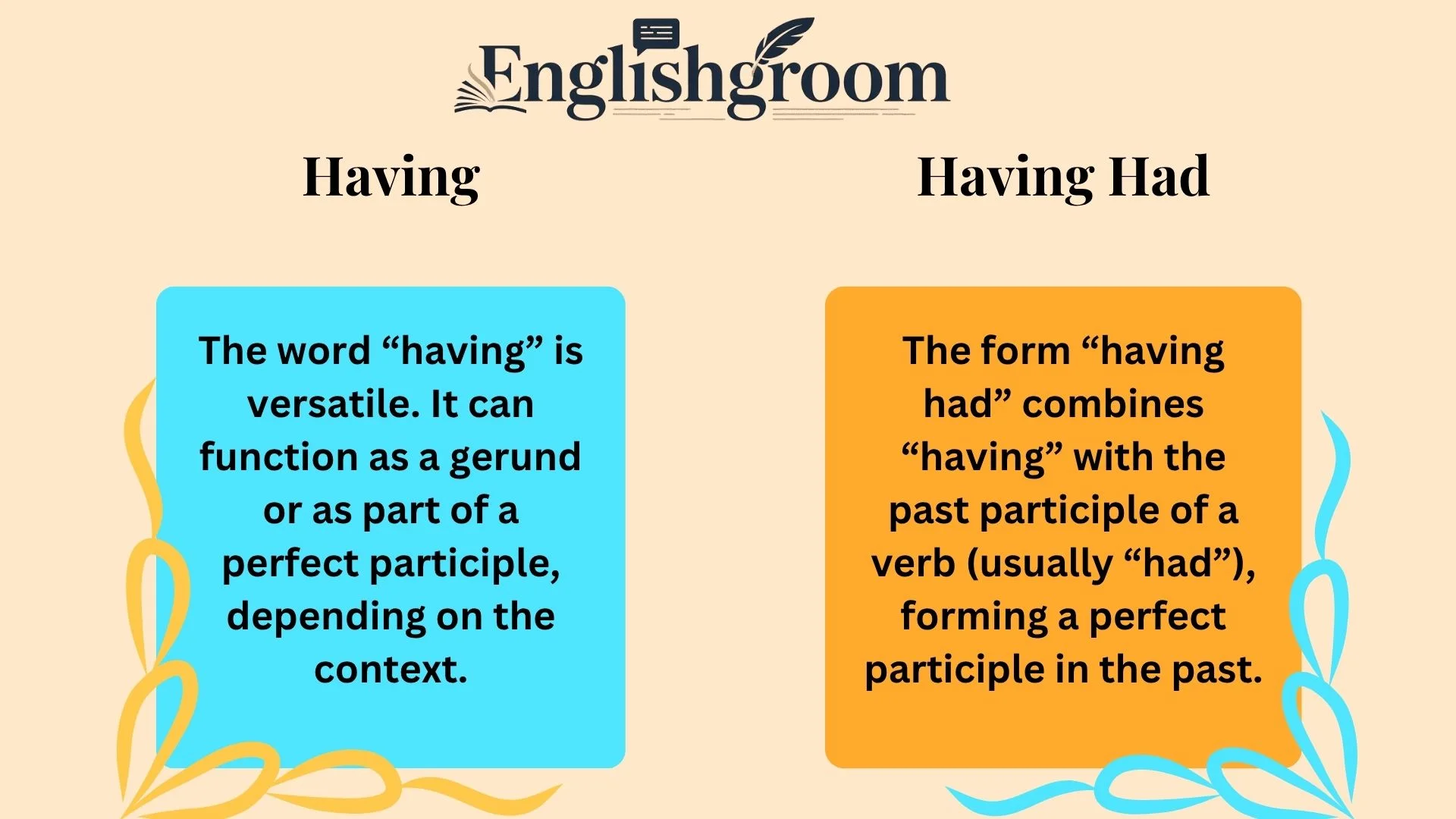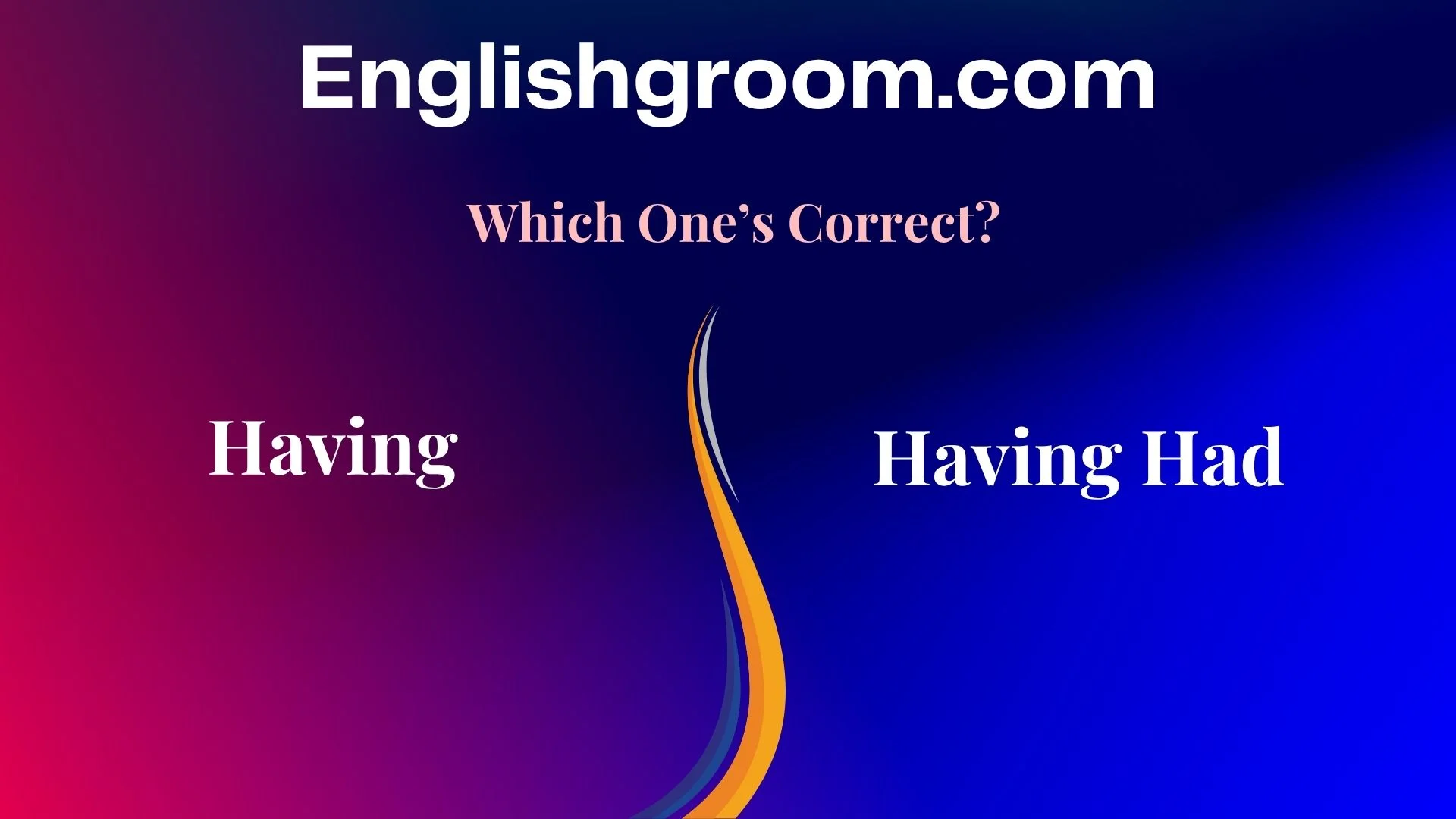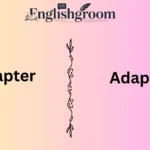Understanding “having” vs. “having had” is one of those grammar puzzles that can trip up even advanced English learners. These forms appear similar but carry distinct meanings and subtle time references.
Mastering them can make your writing and speech clear, precise, and professional.
In this article, we’ll break down their uses, compare them side by side, show practical examples, and even give exercises to practice.
Understanding “Having”
The word “having” is versatile. It can function as a gerund or as part of a perfect participle, depending on the context.
As a Gerund
A gerund is a verb form ending in -ing that behaves like a noun. When “having” acts as a gerund, it often refers to possession, experience, or an ongoing action.
Examples:
- Having a pet brings joy and responsibility.
- She enjoys having tea in the morning.
- Having friends who support you is invaluable.
Here, “having” functions as a noun, showing the act or state of possessing or experiencing something.
As a Perfect Participle
In perfect constructions, “having” introduces an action completed before another action. It emphasizes the sequence of events.
Examples:
- Having finished her homework, she went out to play.
- He apologized, having realized his mistake.
In these cases, “having” signals that one action was completed before the main action occurred, making the timeline clear.

Understanding “Having Had”
The form “having had” combines “having” with the past participle of a verb (usually “had”), forming a perfect participle in the past.
When to Use “Having Had”
“Having had” is used to describe an experience or action completed before another past action. This is slightly more precise than simple “having,” and it often appears in formal or literary contexts.
Examples:
- Having had breakfast, they left for the airport.
- She felt confident, having had years of training.
Notice the nuance: the event of having breakfast or training occurred before the past action.
Comparing “Having” vs. “Having Had”
To clarify the difference, here’s a side-by-side comparison table:
| Feature | Having | Having Had |
|---|---|---|
| Form | Gerund or present participle | Perfect participle (having + past participle) |
| Time Reference | Present or ongoing action | Completed action before another past event |
| Function | Possession, experience, ongoing actions | Sequence of past events, experiences |
| Example | Having friends helps you feel supported. | Having had friends in school, she easily adapted to college. |
Mnemonic tip:
- Use having for current or ongoing states.
- Use having had for past experiences or completed actions.
When “Having Had” Is Necessary
Some contexts require “having had” to avoid ambiguity. This is especially true when describing past experiences that influence later actions.
Examples in context:
- Having had little sleep, he struggled through the meeting. → Shows that lack of sleep happened before the meeting.
- Having had previous experience in negotiations, she handled the client smoothly. → Past experience directly impacts present action.
Tip: In storytelling or reflective writing, “having had” can add depth and chronological clarity.
Common Errors & How to Avoid Them
Even advanced learners often mix these forms. Here are the most frequent mistakes:
- Using “having” instead of “having had” for past events
- ❌ Having breakfast, he felt energized. (Incorrect if referring to past)
- ✅ Having had breakfast, he felt energized.
- Redundant phrasing
- ❌ Having had already had dinner, she wasn’t hungry.
- ✅ Having had dinner, she wasn’t hungry.
- Misplaced participles
- ❌ He went to the park having finished his homework. (awkward)
- ✅ Having finished his homework, he went to the park.
Formality & Context: Choosing the Right Form
| Context | Preferred Form | Example |
|---|---|---|
| Academic writing | Having had | Having had multiple case studies, the researchers drew conclusions. |
| Business communication | Having / Having had | Having completed the report, please review the figures. |
| Informal speech | Having | Having lunch now, can’t talk. |
Insight: In casual conversation, “having” is more common. For formal writing or reflective texts, “having had” adds sophistication and clarity.
Grammar Behind the Scenes: Perfect Participle Explained
The perfect participle highlights prior completion relative to another action.
- Formation: having + past participle
- Function: Shows chronological precedence without needing extra clauses.
- Example Timeline:
Event 1: She completed training → Event 2: She started the job
Sentence: Having had training, she started the job confidently.
This structure compresses two events into one smooth sentence, emphasizing cause and effect.
Practical Mastery: Exercises & Real-Life Examples
Real-Life Examples
- Having had a long day, he fell asleep instantly.
- Having met the CEO before, she felt at ease during the interview.
- Having studied French for years, he understood the conversation perfectly.
Mini Exercises
Fill in the blanks with having or having had:
- ________ finished the project, she went home.
- ________ lunch early, he skipped the café.
- ________ never visited London before, he was amazed by the city.
- ________ training extensively, they won the championship.
- ________ a dog growing up, she loves animals.
Answer Key:
- Having
- Having had
- Having
- Having had
- Having
Summary & Key Takeaways
- “Having” = ongoing action, gerund, or present participle.
- “Having had” = completed past action influencing another past event.
- Use tables and timelines to visualize sequence of events.
- Avoid common errors like misplacement or redundancy.
- Adjust usage according to formality and context.

Frequently Asked Questions
What is the difference between “having” and “having had”?
Answer: “Having” refers to ongoing or present actions; “having had” refers to completed actions that happened before another past event.
Can I use “having” in past tense?
Answer: Only if the main action is also in present tense. For past actions, use having had.
Is “having had” formal or casual?
Answer: It’s typically formal or literary. “Having” is more common in casual speech.
Can “having” and “having had” be used with all verbs?
Answer: Mostly yes, but “having had” often pairs with verbs expressing experience, possession, or accomplishment.
How do I practice using “having had”?
Answer: Write sentences showing past experiences affecting other past events, read literature, and replace past clauses with having had to see the effect.

Hi! I’m Sami, a 28-year-old content writer with a love for words and storytelling. Writing has always been my way of expressing ideas, sharing knowledge, and connecting with people. I enjoy creating engaging and well-researched content—whether it’s blogs, articles, or social media posts—that not only informs but also inspires readers. My goal is to turn complex ideas into clear, creative, and meaningful pieces of writing that leave a lasting impact.



